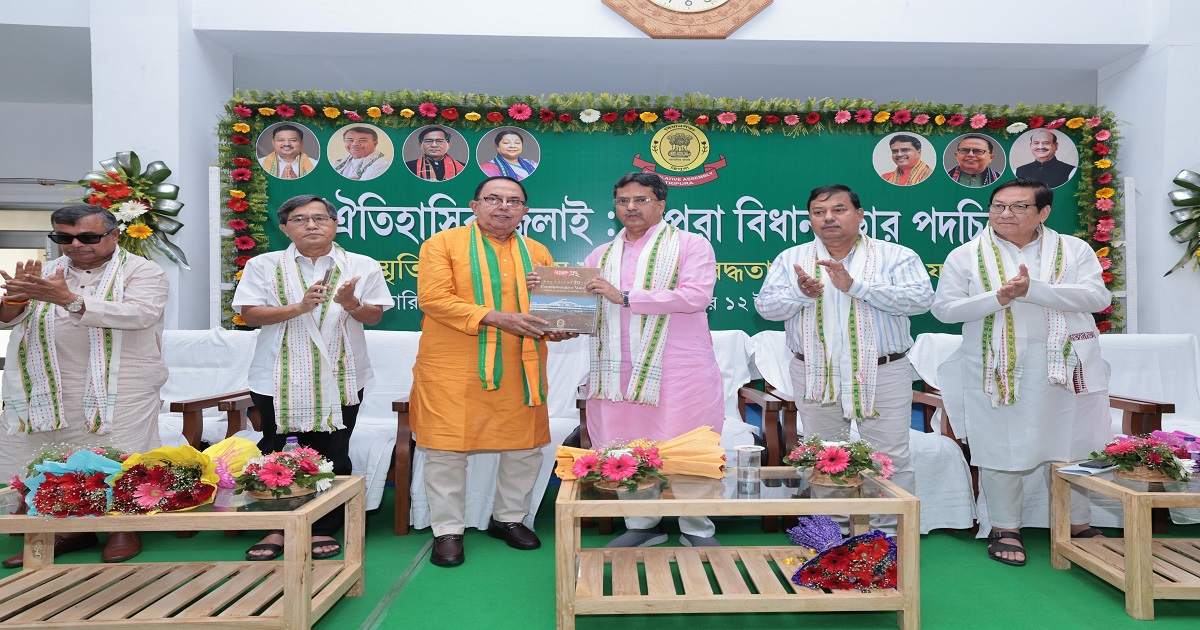Power Minister highlights Tripura Assembly's rich legacy
By Our Correspondent
Agartala, July 23, 2025
 On the occasion of the 62nd anniversary of the establishment of the Tripura Legislative Assembly, Power and Agriculture Minister Ratan Lal Nath today paid tribute to the state’s rich democratic legacy and recounted lesser-known historical milestones that shaped Tripura's political journey.
On the occasion of the 62nd anniversary of the establishment of the Tripura Legislative Assembly, Power and Agriculture Minister Ratan Lal Nath today paid tribute to the state’s rich democratic legacy and recounted lesser-known historical milestones that shaped Tripura's political journey.
Minster said this while addressing a programme marking the establishment of the Tripura Legislative Assembly in presence of Chief Minister Prof. Dr. Manik Saha, Speaker Biswabandhu Sen, Deputy Speaker Ramprasad Paul and others.
Minister Nath said, “This day is not just a date on the calendar, but a chapter of Tripura’s vibrant history.”
He reminded everyone that Tripura’s legislative journey officially began in 1963, but its roots trace back to the visionary leadership of Maharaja Bir Bikram Kishore Manikya Bahadur.
He said Maharaja Bir Bikram laid the foundation of modern Tripura, and contributed immensely in the development of infrastructure including roads, hospitals, schools, and even the airport.
“After his demise, Rajmata Kanchan Prabha Devi played a crucial role in integrating Tripura with India. On September 9, 1949, she signed the Instrument of Accession, and Tripura became a part of the Indian Union”, said Minister.
Minister said that following its accession, Tripura was declared a Union Territory, and Ranjit Roy, ICS, was appointed as the first Chief Commissioner. The Territorial Council Act was enacted in May 1963 with the approval of the President of India. As per Article 239 of the Constitution, a representative administrator was appointed, and the Tripura Territorial Council was constituted with 30 elected and one nominated member.
He further informed that on this very day, Sachindra Lal Singha became the first Chief Minister of Tripura. This marked the beginning of democratic governance in the state. The Territorial Council was formally converted into the Tripura Legislative Assembly on July 1, 1963.
The minister highlighted that the first Assembly had 30 members, a system that continued till 1971. Tripura was later granted full statehood by an Act of Parliament in January 1972, providing the people of the state complete democratic rights.
Recollecting Tripura’s early political stalwarts, Minister shared that in 1963, prominent leaders who were elected as MLAs included Pramod Ranjan Das Gupta from Mohanpur, Sachindra Lal Singh from Agartala, Hemanta Deb from Old Agartala, Birchandra Debbarma from Takarjala, Umesh Lal Singh from Bishalgarh, Mansur Ali from Sonamura, Nripen Chakraborty from Khowai, Prafulla Kumar Das from Teliamura, Kalyan Nath Chowdhury from Dharmanagar.
He said that only five MLAs from the 1971 Assembly are alive today: Tapas Dey, Laxmi Nag, Ajay Biswas, Samir Ranjan Barman, and Sushil Chowdhury.
Reflecting on the evolution of the Assembly’s physical location, Nath shared that the first sessions were held in the old Secretariat Building in Agartala—where Birchandra State Library now stands. Later, the Assembly moved to the historic Ujjayanta Palace. In 2011, after 48 years, it was finally relocated to its current modern premises.
“This new building is not just a structure; it is a symbol of democracy and the aspirations of the people of Tripura,” Nath said, concluding his address.
more news...